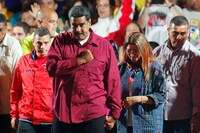Two hard facts set the terms for the future of U.S. policy in Venezuela. First, the regime in Caracas is one of the most repressive and destabilizing on the planet. There are 277 political prisoners, according to ForoPenal, a Venezuelan nongovernmental organization. Torture is systematic and responsibility for it runs straight to the office of President Nicolás Maduro, according to a scathing report published in September by United Nations investigators. Mr. Maduro’s inner circle is also deeply implicated in corruption and drug trafficking; colossal economic mismanagement has impoverished the once-prosperous oil exporter to the point where 7.1 million people — roughly one-quarter of its population — have migrated abroad since 2015.
How to make sure the U.S.’s new policy in Venezuela gets results

The second fact is that the United States and its international partners have so far proved incapable of spurring change. For roughly the last half of the Trump administration, the United States pursued tough economic sanctions coupled with diplomatic recognition for an opposition politician, Juan Guaidó, who made an alternative claim to the presidency and promised a transition to democracy. That policy enjoyed rare — for one of Mr. Trump’s initiatives — but wide support from Latin American and European democracies. And yet Venezuela’s military backed Mr. Maduro, as did his patrons in Cuba, Iran, Russia and China; he rode out the crisis.
Given the history, the Biden administration was right to reassess U.S. options and seek a more effective course toward the democratic transition for which so many Venezuelans have sacrificed and struggled. The administration’s most dramatic new policy departure came Saturday, when it announced that a U.S. oil company, Chevron, would be allowed to resume operations in Venezuela under a joint venture with the state-owned industry previously barred by sanctions. While modest in practical terms — Venezuela’s oil infrastructure is too dilapidated and indebted to ramp up production and revenue soon — this concession was symbolically significant. It came in return for no irreversible political reform but rather a promise from Mr. Maduro to resume talks with the democratic opposition on a path toward free and fair national elections, probably no later than 2024. Additionally, the regime and opposition agreed to tap approximately $3 billion of blocked Venezuelan assets outside the country and put them at the disposal of a humanitarian relief fund. The funds are supposed to be used for health, electrical power and other necessities, with spending controlled by the United Nations and monitored by representatives of the opposition. Nevertheless, money is fungible and anything that makes it easier for Mr. Maduro to afford basic needs for the country makes it easier for him to rule.
In short, the new policy confers on the regime economic breathing room and international legitimacy — in addition to the diplomatic boost Mr. Maduro had already reaped from high-level talks with U.S. officials in Caracas, U.S.-Venezuela prisoner swaps and a fleeting but thoroughly photographed handshake with U.S. envoy John F. Kerry at the recent climate summit in Egypt. The Biden team’s theory is that these sweeteners, and the prospect of more, could induce the regime into a negotiation with its domestic opponents and, eventually, a genuine political opening for them. It’s a plausible theory. Given Mr. Maduro’s track record of deception and repression, however, the risk is high that Biden-style engagement will prove no more fruitful than Trump-style pressure.
The administration must be realistic about that risk and take steps to reduce it. In tandem with the Venezuelan opposition, it must set clear and consistent benchmarks by which to measure the Maduro regime’s good faith in the talks ahead. And it must be prepared to cease sanctions relief — even “snap back” sanctions — if Caracas stalls or cheats.
The humanitarian aid program must be swiftly established and made fully transparent to prevent well-connected officials from diverting funds, as they did — to the tune of hundreds of millions of dollars — from a previous Venezuelan program intended to distribute food to the poor. To be sure, it could take time to work out the legalities and technicalities of getting funds released from banks around the world and then build a U.N. program from scratch. Still, Caracas’s willingness to provide unfettered in-country access and real-time data to U.N. officials will be a test of its intentions more generally.
Difficult as this will be, holding the regime to its political promises will be even more challenging. The United States must make clear that future sanctions relief depends on irreversible political changes, starting with the release of political prisoners. There should be a clear timeline for elections and reform of the country’s main election agency, the National Electoral Council, which is dominated by Mr. Maduro’s backers. Media access and physical safety for opposition candidates must also be guaranteed, with international observers on the ground. At a minimum, Venezuela should agree to the 23 recommendations a European Union delegation made after observing state and local elections last year, in which the opposition participated and achieved success in a key governor’s race, despite the system’s many flaws. Those recommendations, perhaps the most important of which are the restoration of independent courts and the right of all citizens to run for office, provide a road map for democratic restoration.
It’s not easy to topple a dictatorial regime by sanctions, as the Trump policy showed. It’s also not easy to use calibrated sanctions relief to cajole a dictator into negotiating his own possible defeat at the polls. The Biden administration has embarked on its new policy at least partly in the hope of mitigating the chaos Mr. Maduro’s rule has spread across the entire hemisphere — including through a migration wave crashing over the southern U.S. border. Stability is indeed a vital U.S. national interest; but in Venezuela it is impossible without democracy.






